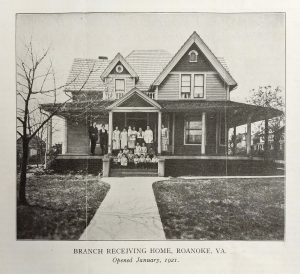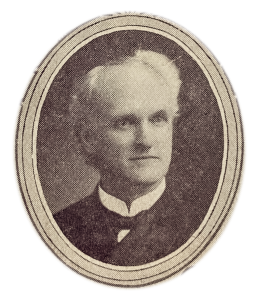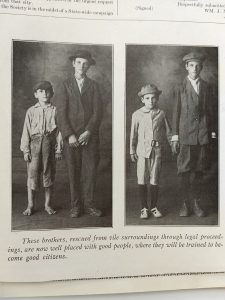For the past two months, we have been writing blogs about our rich history, starting with our founding year of 1900. This blog focused on the turn of the twentieth century and the new era of hope for improving child welfare. The next blog, 1910, addressed our early staff, financials and organization expansion.
This month, we dive into the roaring 20s.
Keep reading to learn about the new Roanoke branch, Dr. C.C. Carstens, community partnerships and staff evolution.
Roanoke Branch | Receiving Home | Improving Child Welfare

At the beginning of 1919, the Board of Directors appointed a committee of Roanoke citizens to secure a property for a receiving home, which was purchased in 1920. This receiving home served the Children’s Home Society as it operated in the western part of the state.
Miss L.C. Maddox became the worker of the Roanoke branch. She and the matron, Miss Rubie Venable, approved the admission of the children.
Several older girls of the home helped Miss Venable upkeep the home.
By 1925, the Roanoke branch had grown rapidly and housed approximately thirty children. Miss Venable hired Miss Rosebud Campbell as an extra matron, Mrs. E.F. Gills who worked in the office, as well as Miss Fannie Yarborough who investigated and visited.
Dr. C.C. Carstens Survey
In 1926, Dr. C.C. Carstens investigated and analyzed all parts of The Children’s Home Society as a whole, including both the Richmond and Roanoke receiving homes.
He made several recommendations for the future of the program.
Recommendations | Better Training & Better Care

His findings concluded that one of the greatest needs for the children was an improvement in medical assessments and care. Those in charge of the children would be required to know more about their social and medical histories to provide better care and training.
Up until this point, there were no professional trained workers on staff. Interest was practically the only qualification.
Dr. Carstens mandated that trained social workers needed to be hired.
As a result of this investigation, Reverend William J. Maybee, CHS’ State Superintendent since our founding in 1900, began innovations in both policies and in the physical setup of the agency in an attempt to fulfill the recommendations presented by Dr. Carstens.
The Board of Directors immediately began to augment and raise the staff’s standard.
A hospital room was built in the receiving home, equipped with the latest instruments and appliances. In 1927, Mr. Maybee reported that 77 minor operations had already been performed.
“All children coming to us, whether new or returned wards have been thoroughly examined both physically and mentally. Last October, we fitted out a schoolroom in our old receiving home in Highland Park and engaged Mrs. Minnie Flournoy, an experienced teacher who organized her school. We find this very helpful to the children. It gives them not only a start in education but also helps them in their manners and deportment.”
In addition, a general reorganization of the system of records, files and statistics were perfected under the direction of Miss Winifred G. Crenshaw.
Richmond Junior League
In 1929, the Richmond Junior League organized a committee to manage the receiving home. This committee made up of actively interested women, assumed the management and supervision of the home and direction of its activities. Up until this time, the home had been under a committee made up of directors of the society. These were businessmen who had very little time to give. The decision of the Junior League to accept this responsibility was considered one of the most important progressive steps in the history of the society.
Below, we outline agency statistics from 1927 to 1929.
| Year | New Wards | Returned | Total Cared For |
| 1927 | 157 | ||
| 1928 | 131 | 188 | 319 |
| 1929 | 106 | 144 | 250 |
| 1927 | 1928 | 1929 | |
| Adopted | 53 | 50 | 18 |
| Transferred to Other Institutions (Medical) | 8 | 13 | 9 |
| Returned to Relatives | 7 | 21 | 26 |
| Of Age | 21 | ||
| Married or Died | 8 | 13 | 5 |

Community Partnerships
During the twenties, because of The Child Welfare League’s recommendations, Mr. Maybee suggested broadening the program to serve other children besides those taken for adoption or placement so that the agency would meet every situation involving a child with a sense of responsibility.
“We hope, by an elastic program and thorough casework, to follow out this recommendation, also making every effort to conserve family ties, strengthen local agencies and educate communities to their social needs.”
The changes implemented by the Children’s Home Society did not go unnoticed.
“Your organization has a field in public welfare work in this state not occupied by any other agency. Your recent re-organization and the employment of additional trained workers has put the Children’s Home Society in the front rank of agencies that are at work for underprivileged children.” — Dr. J.T. Masten, Secretary of the State Board of Charities and Corrections
“Particularly in the past two years has the Children’s Home Society contributed largely to the statewide problem of providing proper care for the dependent child. Your recent organization, with the employment of additional trained personnel, has served to develop state-wide confidence in your work and should be conducive to larger support from the state itself and from outside agencies.” — Frank Bane, State Commissioner of Public Welfare
Resignation of Mr. Maybee & Hiring of Frank Davis Preston
On September 25, 1929, after 30 years of continuous, loyal, and steadfast service to the Children’s Home Society, Mr. Maybee resigned his position as state superintendent. Many gracious and sincere tributes were paid for his work as a diligent worker and path-finder in the child-placing field.
Frank Davis Preston took over the duties of the office of the superintendent. Mr. Preston came to Virginia with rich experience in the fields of social work and law.
Stay tuned next month when we explore the 1930s.
Support Virginia Adoption & Child Welfare
Since Children’s Home Society was chartered in 1900, we have had the joy of serving over 14,500 children and families in Virginia. Today, in addition to facilitating private adoptions, CHS specializes in finding permanent homes for harder to place teens or children with physical or emotional challenges, often due to abuse or neglect.
If you want more information on how to give a child in need a forever home, get in touch with us today: 804-353-0191
Click here to learn about our creation in the 1900’s
Click here to learn about about our organizing efforts in the 1910’s
